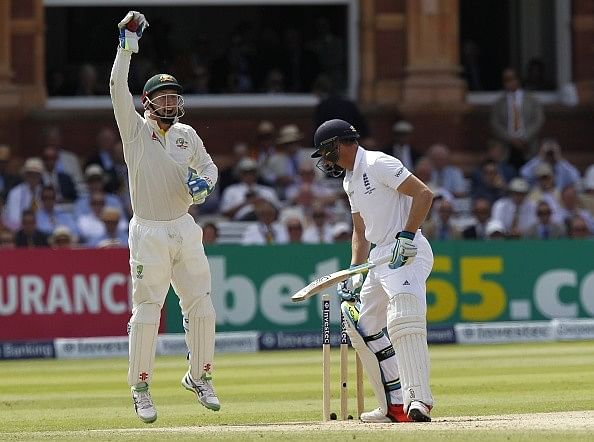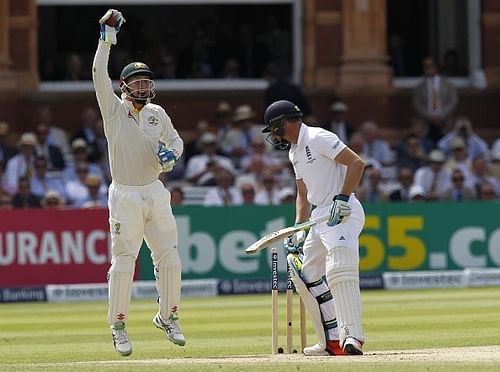
To walk or not to walk - Jos Buttler's honesty and cricket's most difficult ethical dilemma
24-year-old English wicketkeeper Jos Buttler did the unthinkable on Saturday, the Day 3 of the 2nd Ashes Test – he walked. England were batting at 210/6, Alastair Cook and Buttler patiently trying to get close to Australia’s massive first innings score of 566, when umpire Kumar Dharmasena failed to spot the England No.7 feathering an edge off Nathan Lyon’s bowling.
Australia went up in appeal. The umpire’s shake of head was forced to turn midway into an embarrassed nod – Buttler had already started making the lonely walk back to the Lord’s pavilion.
Buttler’s action has re-ignited the trickiest ethical dilemma facing any batsman, a dilemma only accentuated by the multiple camera angles and technological devices which capture the moment of truth retrospectively in modern day cricket. On Saturday, Hot Spot showed nothing, although Snicko appeared to validate Buttler's honesty.
The Australian who walked and the one who didn't
Buttler is a self-confessed fan of Adam Gilchrist, the Australian wicketkeeper who was himself responsible for igniting the ‘to walk or not to walk’ debate after he had walked in the 2003 World Cup semi-final against Sri Lanka. It was proved on Saturday that being an aggressive wicketkeeper-batsman is not the only thing Buttler has picked up from the Australian – he has picked up Gilchrist’s personal philosophy too.
Ricky Ponting, the Australian captain who oversaw Gilchrist’s earth-shattering act in 2003 with shock, had a vantage point of Buttler’s act from the commentary box.
He recalled, "I was very surprised to see my vice-captain and one of the most destructive opening batsmen in the world walk in a World Cup semi-final for the first time in his career.”
Ponting also said that he had reproached Gilchrist when the both of them were back in the pavilion, for choosing such an important stage for his unselfishness, however adding, "I admired his stance once we got through the semi-final – once I knew we were safe and we won that semi-final."
In the 2011 World Cup, Ponting was himself faced with the same ethical dilemma, and he made his stand abundantly clear. In a match against Pakistan, the umpire failed to spot that he had nicked the ball, and Pakistani appeals were turned down. The decision was reviewed by Pakistan, and Ponting was adjudged out.
"There were no doubts about the nick, I knew I hit it, but as always I wait for the umpire to give me out. That's the way I've always played the game," Ponting had said on the occasion.
Sachin Tendulkar, faced with this dilemma in the same World Cup, a century away from completing 100 international tons, decided to walk after an inside-edge, despite the umpire shaking his head amid the deafening noise in Chennai.
Spirit of the Gentleman's Game
It is understood that the umpires will make mistakes in the course of a match, sometimes giving ‘out’ unfairly and sometimes missing a nick, and that it ‘all evens out in the end’ – something Ponting would heartily agree to. However, individuals such as Gilchrist and Buttler seem to find it important that they have to live with themselves after the day’s play.
Which is truer to the ‘spirit of the Gentleman’s Game’ is anybody’s guess.
The moment of truth – when the batsman has to choose whether to give himself out – pits individual principles against team ethos, professionalism against honesty, the laws of cricket against the laws of conscience. The split-second choice would be predetermined by how the particular individual has planned to go about the business of life.
Then there is the cricketing Machiavelli, such as Nick Knight, the former England opener, who forwards the notion of ‘selective walking’. He says he would walk if personal average/form permitted it, and the situation of the game did not demand sticking on at the crease at whatever cost – a lot of calculations to make for the one second when the world is looking at you.
However, it has to be remembered that as much as Gilchrist, Tendulkar and Buttler deserve praises for walking when not called upon to do so, it is perfectly natural, also, to not raise an eyebrow when someone does not walk despite an obvious nick. That is the way the game has been designed.
Had the laws of conscience provided the rule book for cricket, there would be no half-appeals for lbws or caught behinds. The sport would be a much quieter, and perhaps duller place.
Expect they're producing "Jos Buttler is a great bloke" T-shirts in Sydney and Melbourne as we speak...
— Lawrence Booth (@the_topspin) July 18, 2015
